

This Is Why Understanding Time Is So Hard. Reversing cause and effect is no trouble for quantum computers. Watch a movie backwards and you'll likely get confused—but a quantum computer wouldn't.
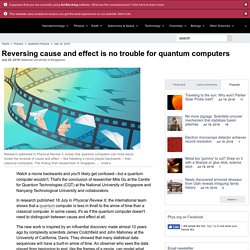
That's the conclusion of researcher Mile Gu at the Centre for Quantum Technologies (CQT) at the National University of Singapore and Nanyang Technological University and collaborators. In research published 18 July in Physical Review X, the international team shows that a quantum computer is less in thrall to the arrow of time than a classical computer.
In some cases, it's as if the quantum computer doesn't need to distinguish between cause and effect at all. The new work is inspired by an influential discovery made almost 10 years ago by complexity scientists James Crutchfield and John Mahoney at the University of California, Davis. Where Did Time Come From, and Why Does It Seem to Flow? Paul Davies has a lot on his mind—or perhaps more accurate to say in his mind.

A physicist at Arizona State University, he does research on a wide range of topics, from the abstract fields of theoretical physics and cosmology to the more concrete realm of astrobiology, the study of life in places beyond Earth. Nautilus sat down for a chat with Davies, and the discussion naturally drifted to the subject of time, a long-standing research interest of his. Here is a partial transcript of the interview, edited lightly for length and clarity. There might be some pre-geometry, that would give rise to geometry just like atoms give rise to the continuum of elastic bodies. What Can We Learn From Degas About the Nature of Time? On a recent Saturday morning, my wife, Susan, and I slipped into the city to visit the Metropolitan Museum of Art, a place we hadn’t gone together since before our sons were born.

The crowds hadn’t yet descended and for an hour or so we wandered around and absorbed the cavernous hush of art. We separated for a bit, together but apart; while Susan roamed among the Manets and Van Goghs I slipped into a small side gallery, not much larger than a subway car, that held a series of glass cases with small bronze sculptures by Degas. There were a few busts and several horses in stride and the figure of a woman stretching, a small bronze rising to her feet and curling her left arm upward as if waking from a long nap. At the end of the gallery, in one long case, were two dozen ballerinas in various states of motion or repose.
One dancer was examining the sole of her right foot; another was putting on her stocking; a third stood with her right leg forward and her hands behind her head. The Secret Life of Time. Some nights—more than I like, lately—I wake to the sound of the bedside clock.

The room is dark, without detail, and it expands in such a way that it seems as if I’m outdoors, under an empty sky, or underground, in a cavern. I might be falling through space. I might be dreaming. I could be dead. Only the clock moves, its tick steady, unhurried. I’m tempted to look at the clock, but I already know that it’s the same time it always is: 4 A.M., or 4:10 A.M., or once, for a disconcerting stretch of days, 4:27 A.M. Quantum Gravity’s Time Problem. Theoretical physicists striving to unify quantum mechanics and general relativity into an all-encompassing theory of quantum gravity face what’s called the “problem of time.”

In quantum mechanics, time is universal and absolute; its steady ticks dictate the evolving entanglements between particles. But in general relativity (Albert Einstein’s theory of gravity), time is relative and dynamical, a dimension that’s inextricably interwoven with directions x, y and z into a four-dimensional “space-time” fabric. How To Trick Your Brain To Slow Down Time. It was a reasonable question to ask.
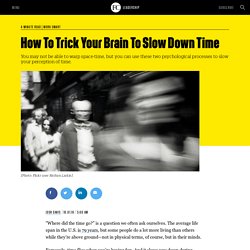
Apple purchased a 3D imaging company called PrimeSense in 2013, and now has released a phone with two camera lenses and the ability to perceive depth of field, the base requirement for capturing 3D spaces and objects. Add that to the fact that Apple CEO Tim Cook has made several statements expressing his interest in augmented reality. So it’s natural to wonder if the iPhone 7 Plus represents Apple’s first steps toward some augmented reality product that could place 3D objects over a real-world space.
Microsoft’s HoloLens headset already does just that, as does Lenovo’s PHAB 2 Pro, the first product to embody Google’s Project Tango AR technology. The iPhone 7 Plus features a 28mm wide angle lens and an additional 56mm lens (which technically is not the telephoto lens that Apple’s promo materials suggest, but rather something like a "portrait" lens). A Debate Over The Physics Of Time. Einstein once described his friend Michele Besso as “the best sounding board in Europe” for scientific ideas.
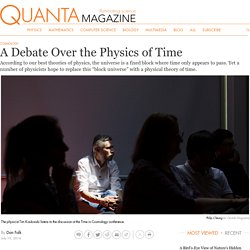
They attended university together in Zurich; later they were colleagues at the patent office in Bern. When Besso died in the spring of 1955, Einstein — knowing that his own time was also running out — wrote a now-famous letter to Besso’s family. “Now he has departed this strange world a little ahead of me,” Einstein wrote of his friend’s passing. “That signifies nothing. For us believing physicists, the distinction between past, present and future is only a stubbornly persistent illusion.” The Psychology of Time and the Paradox of How Impulsivity and Self-Control Mediate Our Capacity for Presence. “Reality is never and nowhere more accessible than in the immediate moment of one’s own life,” Kafka once told a teenage friend.
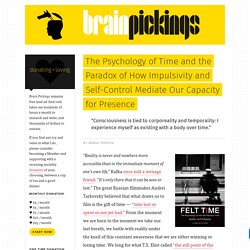
“It’s only there that it can be won or lost.” The great Russian filmmaker Andrei Tarkovsky believed that what draws us to film is the gift of time — “time lost or spent or not yet had.” From the moment we are born to the moment we take our last breath, we battle with reality under the knell of this constant awareness that we are either winning or losing time. We long for what T.S. Eliot called “the still point of the turning world,” but in chasing after it we spin ourselves into a perpetual restlessness, losing the very thing we strive to win.
Why does time pass? Timeless. Redefining Time installation. Jay Mark Johnson’s very unusual camera emphasizes time over space. Jay Mark Johnson.

The abstract-seeming images here are not the result of some wacky Photoshopping. Jay Mark Johnson’s photos are actually incredibly precise. The reason they look like this is because he uses a slit camera that emphasizes time over space. Whatever remains still is smeared into stripes, while the motion of crashing waves, cars and a Tai Chi master’s hands are registered moment by moment, as they pass his camera by. Like an EKG showing successive heartbeats, the width of an object corresponds not to distance or size, but the rate of movement. Yes, it’s a confusing concept. When Will Time End? Krishnamurti & David Bohm The Future of Humanity 11. The Philosophy of Time. Kant,_goedel_and_relativity.PDF (application/pdf Object) On Time and Free Will. What Does Physics Teach Us About Determinism?
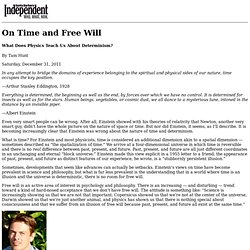
By Tam Hunt Saturday, December 31, 2011 In any attempt to bridge the domains of experience belonging to the spiritual and physical sides of our nature, time occupies the key position. —Arthur Stanley Eddington, 1928 Everything is determined, the beginning as well as the end, by forces over which we have no control.
—Albert Einstein Even very smart people can be wrong. Alan Watts - Time (as social institution) Philosophy of Time part 1 of 3. Nature of time. Time is the most fundamental aspect of our experience, and yet it remains mysterious in many ways. A longstanding problem is time's arrow – the directionality displayed by most physical processes, for example, clocks run down, organisms age, stars burn out. The laws of physics are symmetric in time, so the appearance of asymmetry from symmetry can be understood only by looking outside the system.
Ultimately that leads to cosmology. Syntropy. Time: Reversible or Irreversible? - Fringe Science. Classical physics says time is reversible because its laws hold true whether time flows forward or backward. Thermodynamics says time only flows forward, because were it to reverse, entropy of an isolated system could decrease which would violate the second law of thermodynamics. So is time reversible or irreversible? The answer cannot be deduced from either classical physics or thermodynamics because both are flawed in their assumptions. Classical Systems are Timeless Classical physics only deals with deterministic systems whose past, present, and future are entirely contained in a single timeless equation. Irreversibility. Irreversibility According to the second law of thermodynamics, the entropy (a measure of disorder or chaos) of an isolated system (one that does not exchange matter, energy, or information with its environment) will remain unchanged for reversible processes but will increase for irreversible processes.
Thus irreversible systems, including all living systems, tend to become chaotic as their entropy increases. Irreversible process. In thermodynamics, a change in the thermodynamic state of a system and all of its surroundings cannot be precisely restored to its initial state by infinitesimal changes in some property of the system without expenditure of energy. A system that undergoes an irreversible process may still be capable of returning to its initial state; however, the impossibility occurs in restoring the environment to its own initial conditions.
An irreversible process increases the entropy of the universe. However, because entropy is a state function, the change in entropy of a system is the same whether the process is reversible or irreversible. The second law of thermodynamics can be used to determine whether a process is reversible or not. Many biological processes that were once thought to be reversible have been found to actually be a pairing of two irreversible processes. Absolute versus statistical reversibility[edit] New Theory Claims that Time is Not the 4th Dimension. Einstein never interpreted time "t" as a fourth dimension of space. Space is not 3D + T, space is 4D. The Quantum Mechanics of Fate - Issue 9: Time. “The objective world simply is, it does not happen,” wrote mathematician and physicist Hermann Weyl in 1949. Controversially, Physicist Argues Time Is Real. NEW YORK — Is time real, or the ultimate illusion? Most physicists would say the latter, but Lee Smolin challenges this orthodoxy in his new book, "Time Reborn" (Houghton Mifflin Harcourt, April 2013), which he discussed here Wednesday (April 24) at the Rubin Museum of Art.
In a conversation with Duke University neuroscientist Warren Meck, theoretical physicist Smolin, who's based at Canada's Perimeter Institute for Theoretical Physics, argued for the controversial idea that time is real. 'Time Crystals' Could Upend Physicists' Theory of Time. Through the Wormhole: Does Time Exist? When you're having fun, time flies. Waiting in a traffic jam, not so much. Your birthday was last month, and your mortgage payment is due in a few days. 2 Futures Can Explain Time's Mysterious Past. PlanckScale.pdf (application/pdf Object) » Leap Seconds and the Nature of Civil Time. Physicists Unveil World's Most Precise Clock (And a Twin to Compare It Against)
How a quartz watch works. Time Shifting. Martial arts students influence the past. The July 1994 edition of New Scientist contained an article by Julian Brown with the rather surprising title "Martial arts students influence the past". For copyright reasons, we are unable to reproduce it here so we shall describe its contents: David Lewis Anderson - Time Travel: Journeys Into Time (preview) Einstein, Gödel, and Our Strange Experience of Time: Rebecca Goldstein on How Relativity Rattled the Flow of Existence. Why Time Slows Down When We’re Afraid, Speeds Up as We Age, and Gets Warped on Vacation. By Maria Popova.